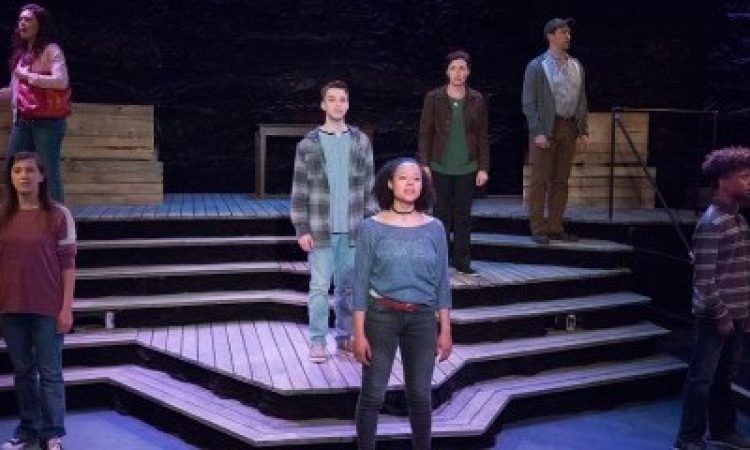In a quest to reach new audiences for performing arts in Philadelphia, Theatre Philadelphia and thINKingDANCE are joining forces and exploring how dance writing and discourse can provide new perspectives on theater. Since May 2018, tD writers have been lending their varied backgrounds, interests, and approaches to criticism to professional works of theater in Philadelphia. Let us know what you think in the comments!
Kittson O’Neill and Robert Kaplowitz’s musical Minors has bits and pieces of compelling dialogue and music but falls short of a well-told story. The musical is based on the victims of the Luzerne County “Kids for Cash” scandal. In 2009, Judge Mark Ciavarella and Judge Michael Conahan made front-page news for exploiting young people through harsh punishments that didn’t fit their alleged crimes. The two judges received more than 2.6 million in kickbacks for detaining youth in two for-profit juvenile facilities. The corruption tainted over 6000 cases overseen by Judge Ciavarella from 2003 to 2008. Nearly 3000 of these cases ended in harsh sentences where more than half of the children had no legal representation and were removed from their homes. Their lives and communities were forever altered. Minors is a creative archive of this case, but it needs polishing before it’s ready for a wider audience.
The cast is filled with new and seasoned talent who bring their characters to life. Terran Scott and Grace Tarves shine in their roles as victims-of-the-system-turned-activists. Several vignettes play out on stage, showing the stories of four young people adjudicated for alleged delinquent acts by Judge Ciavarella. We experience the innocence of teen love and friendship, and the fragile bond between parent and child. Each family collides with the criminal justice system, and they become painfully aware that they don’t know their rights.
In failing to show a nuanced depiction of Judge Ciaverella and his connection to the larger prison industrial complex, however, Minors ultimately falls short in its execution of the story. Paul L. Nolan plays one hell of a villain, but I wish the writing included some of his humanity, to create a more complicated character and to remind audiences this isn’t just a story of one dirty judge. Robert May’s Kids for Cash documentary shares interviews with the judge. Hearing his side, you feel frustrated by his distorted thinking, but you also learn how upbringing influences his worldview. Ciaverella’s authoritarian father inflicted violence as a form of discipline. This upbringing seems to fuel his “zero-tolerance” model, a model which has been disproven as an effective strategy through countless lived experiences. Were these elements included in the musical, they might tie the piece to our larger national conversation on the disparities in the juvenile legal system and the lack of restorative justice. This could also help break the story out of the good/evil binary.
The creators instead focus on past connections to the 18th- to 20th-century coal mining industry in Luzerne. Minors portrays this history through a breaker boy character, played by Sav Souza, who sings chilling lines like, “All they’ve got left to mine is you.” Souza starts out as a broken, defeated worker too afraid to stand up to his employer. By the end, Souza fights back and demands to be seen. We see this same metamorphosis play out for Tarves, Scott, and Mekhi Williams’ characters. The show’s playbill goes into great length on how Luzerne residents, specifically youth, have been exploited over the centuries by companies that put profit over people. In theory this connection is powerful, but the execution seems forced and minor when compared to the current conversation on legal injustices. How many people outside of Luzerne’s mining community will connect to this specific history?
This leads to another major execution issue: the cursory attempt to address institutional racism within the juvenile justice system. Though the Luzerne county scandal affected an overwhelmingly white community, the current movement for criminal justice reform is led by black and brown communities disproportionately affected by the system. It was clear the writers were torn on how to create an effective story through an intersectional lens. To address these issues, they deviate from the actual case and include victims of color. But the writers’ attempt at intersectionality only sheepishly hints at the additional barriers these characters face. One of the vignettes is of a young biracial boy, Frankie Jr., played by Williams, and his white father, Frank Sr., played by Ben Dibble. Frank Sr. laments as his son is adjudicated delinquent, “I didn’t notice when he was younger”…“she tried to warn me,” alluding to his wife’s warning that Frankie Jr. would face racism and police brutality. With his wife deployed in Iraq, he’s left alone to face these challenges. What was missing was more dialogue about this marginalization so that the audience has a deeper understanding of the larger conversation. What if we could see a scene depicting the actual conversation between Frank Sr. and his wife? Or a scene where Frankie Jr. struggles with his own realization of racial disparity in the system? Instead of focusing on the history of coal mining they might include vignettes of other prominent cases of juvenile justice corruption that specifically have affected children of color. Or if they continue with the mining theme, why not provide a deeper understanding of how both mining and private prisons target marginalized people who also lack economic access? It’s hard to tell if the writers included the white breaker-boy character purposely to allude to the construction of whiteness and its influence on poorer European immigrants during this time period.
Minors does succeed in shedding a small light on a broken system that needs dismantling. I hope with more time and revision, Minors can become a stronger work that helps spark conversation and change in the form of restorative justice. Minors shows us that young people are vulnerable, and it reminds us that they deserve empathy, even when they make mistakes.
Minors, Lantern Theater Company, June 28.






